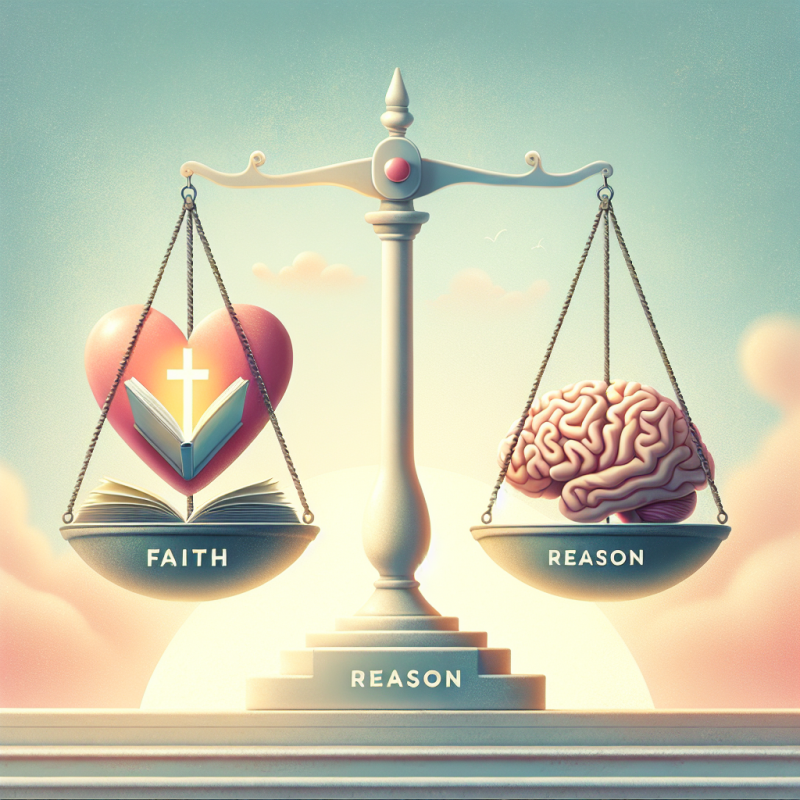The Enduring Dialogue Between Faith and Reason
Throughout history, the relationship between faith and reason has captivated the minds of philosophers, theologians, and believers. Often perceived as opposing forces, faith and reason are, in fact, complementary paths to understanding truth. While faith provides spiritual conviction and insight into the mysteries of existence, reason offers a logical framework to explore, analyze, and deepen that faith. Together, they form an intricate balance that allows individuals to grow both intellectually and spiritually.
This discussion continues themes explored in previous articles, such as Faith and Reason: Allies in the Pursuit of Truth and The Harmony of Faith and Reason: A Lifelong Journey Towards Truth, which have underscored the mutual reinforcement of belief and rational inquiry. In this article, we delve deeper into how faith and reason serve as fundamental components of an integrated worldview.
Faith as the Foundation of Belief
Faith is often associated with trust in the unseen, an embrace of the divine without requiring empirical evidence. It is the guiding force for millions who seek meaning in life, leaning on the wisdom of religious traditions to navigate uncertainty. In Scripture, Hebrews 11:1 defines faith as “confidence in what we hope for and assurance about what we do not see.” This suggests that faith is not blind but rather rooted in certainty beyond physical proof.
Faith offers believers a framework for understanding their purpose, morality, and relationship with God. It does not reject reason but invites it into a dialogue that enriches spiritual understanding. For example, the study of theological doctrines requires careful interpretation, historical context, and intellectual engagement—demonstrating that faith is not an enemy of logic but an arena where reason thrives.
Image: [1,faith and reason concept in theology]
Reason as a Tool for Deeper Understanding
Reason, as a gift of God, allows humans to analyze, question, and discover truth. Many of the greatest Christian thinkers—such as St. Augustine, St. Thomas Aquinas, and C.S. Lewis—have argued that rational inquiry strengthens belief. Aquinas, for instance, famously asserted that reason and faith originate from the same divine source and, therefore, cannot be in conflict.
Across time, reason has played a vital role in theological discussions, enabling believers to engage with critical questions: How do we defend the existence of God? Why does suffering exist in the world? What is the nature of free will? Philosophy and science complement faith rather than undermine it, providing intellectual clarity to mysteries that faith alone may not fully explain.
Image: [2,St. Thomas Aquinas discussing theology with students]
The Harmony Between Faith and Reason
When properly integrated, faith and reason create a holistic approach to truth. Faith provides meaning and direction, while reason refines and clarifies. A faith that dismisses reason risks becoming superstition, just as reason without faith may descend into skepticism or nihilism. The great Christian traditions encourage believers to pursue wisdom—both spiritual and intellectual—to ensure an informed, consistent, and vibrant faith.
This notion of harmony is echoed in Bridging Faith and Understanding: Unlocking the Harmony Between Belief and Reason, where the balance between belief and rational thought is explored. The idea that faith should be free of reason or that reason must exclude faith overlooks the richness that emerges when both work together in concert.
Image: [3,philosopher contemplating religious texts]
Embracing Both in the Modern World
As contemporary society emphasizes logic and empirical evidence, some argue that faith is increasingly at odds with reason. However, this dichotomy is an artificial one. Faith encourages exploration, not ignorance—many of history’s greatest scientific minds, such as Isaac Newton and Gregor Mendel, were deeply religious and saw their discoveries as a way to glorify God.
By embracing both reason and faith, believers strengthen their ability to navigate moral dilemmas, defend their beliefs intelligently, and cultivate a deeper relationship with God. Rather than choosing one over the other, the journey toward truth flourishes when faith and reason walk hand in hand.
In an age of skepticism, this balanced approach helps believers not only hold firm to their convictions but also engage meaningfully with the world around them. Through prayer, study, and rational inquiry, the dialogue between faith and reason continues to shape our understanding of both the physical and spiritual realms.




The dialogue between faith and reason has shaped Christian thought for centuries. Rather than being at odds, they strengthen each other, offering a deeper, more profound pursuit of truth.
This resonates with me. I often struggle to reconcile faith with critical thinking, but this approach makes sense—faith and reason can enrich each other rather than being in conflict.